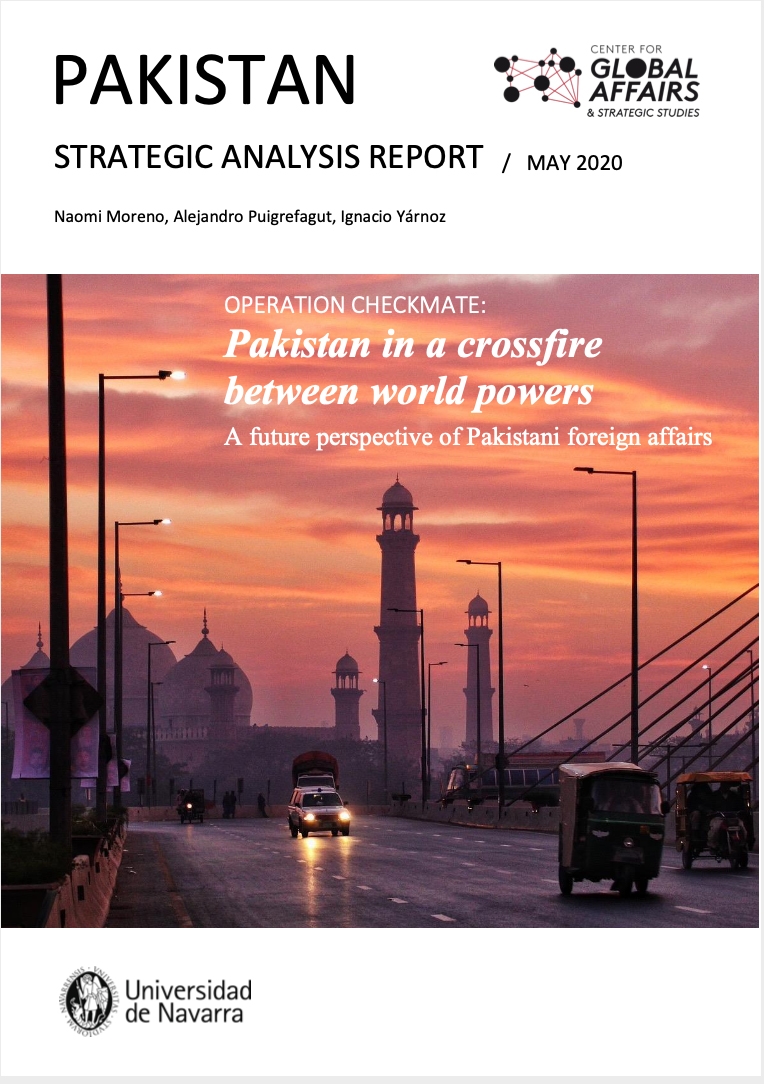![A view of the Badshahi Mosque, in Lahore, capital of the Punjab province [Pixabay]. A view of the Badshahi Mosque, in Lahore, capital of the Punjab province [Pixabay].](/documents/10174/16849987/pakistan-mayo-2020-blog.jpg)
▲ A view of the Badshahi Mosque, in Lahore, capital of the Punjab province [Pixabay].
STRATEGIC ANALYSIS REPORT / Naomi Moreno, Alejandro Puigrefagut, Ignacio Yárnoz
 Download the document [pdf. 1.4MB]
Download the document [pdf. 1.4MB]
May 2020
EXECUTIVE SUMMARY
This report has been aimed at examining the future prospects for Pakistan in the 2025 horizon in relation to other States and to present various scenarios through a prospective strategic analysis.
The research draws upon the fact that, despite the relatively short space of time, Pakistan is likely to undergo several important changes in its international affairs and thus feel forced to rethink its foreign policy. This strategic analysis suggests there could be considerable estrangement between the U.S. and Pakistan and, therefore, the American influence will decrease considerably. Their security alliance could terminate, and Pakistan would cease to be in U.S.' sphere of influence. Moreover, with the new BRI and CPEC projects, China could move closer to Pakistan and finally become its main partner in the region. The CPEC is going to become a vital instrument for Pakistan, so it could significantly increase Chinese influence. Yet, the whole situation risks jeopardizing Pakistan's sovereign independence.
India-Pakistan longstanding dispute over Kashmir seems to be stagnated and will possibly remain as such in the following years. India has taken steps to annex its administered territory in Jammu and Kashmir and Pakistan could potentially follow. The possibility of an open conflict and a nuclear standoff remains possible as both nuclear powers have very different strategies and conceptions which could lead to misinterpretation and a nuclear escalation.
In the quest to rethink its foreign policy, the U.S.-Taliban peace and the empowerment of the group has come as a bolt from the sky for Pakistan. Through its ties with the Taliban, Pakistan could gain itself a major presence in the region namely by reaching out to Central Asia and advance its interest to curtail India's influence. Amid a dire economic crisis, with regards to the Saudi Iranian Cold War, Pakistan could seek a way in which it can recalibrate its stance in favor of the resource-rich Saudi alliance while it appeases sectarian groups who could strongly oppose this potential policy.
Pakistan ought to acknowledge that significant changes ought to be made in both the national and international sphere and that decisive challenges lay ahead.